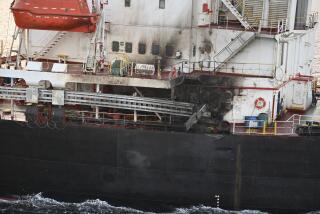NEWS ANALYSIS : CRISIS IN THE BALKANS : New Force Will Ease, Not Solve, U.N. Woes in Bosnia : Balkans: Units will back up peacekeepers. But it isn’t clear how warring parties will react to West’s increased firepower.
- Share via
PARIS — The planned creation of a European strike force in the Balkans was hailed Sunday as the first concrete step toward saving the U.N. peacekeeping mission there from collapse and restoring confidence after a humiliating hostage crisis, but it will take more than a new fighting unit to restore peace.
“What we are saying is that the U.N. needs enhanced protection, and this will provide it,” British Defense Minister Malcolm Rifkind said. “But it will not resolve all the problems of the United Nations in Bosnia.”
The reinforcement force will, in effect, put two new brigades at the disposal of U.N. commanders in the former Yugoslav federation. The first will be a multinational unit of 1,500 to 2,000 French, 1,500 British and 200 to 300 Dutch soldiers, but those numbers may be increased. Joining that unit will be a 4,000-member British air mobile brigade.
Military experts say the force, with promised logistic and air support from the United States, should be able to stabilize the situation in Bosnia-Herzegovina by preventing further hostage-taking by Bosnian Serbs, protecting U.N. forces as they regroup and opening supply routes to embattled enclaves held by the Bosnian Muslim government.
But it isn’t yet clear how the actions of the well-armed new force, the first quick reaction units ever put into the field under U.N. operational control, will be viewed by the warring parties in Bosnia.
It was, in fact, bombing raids by the North Atlantic Treaty Organization that led Bosnian Serbs to take U.N. hostages last month, and the Serbs are refusing to release several hundred remaining hostages without assurances that NATO will not launch additional attacks.
“The situation there is so blocked, and so much at a dead end, that I think the fighting will continue whatever happens,” said Hans Stark, a Bosnia expert with the French Institute of International Relations in Paris. “This quick reaction force won’t really change the war itself.
“The Bosnian Serbs are not satisfied with the military situation on the ground because they don’t control all the territory they occupy, and they will try to push to the south,” he said. “But the Western world, though sympathetic to the Muslims, wants to maintain its impartiality. And that is the contradiction of our policy.”
The main goal of the strike force when it becomes operational, perhaps by late this month, will be to reduce the vulnerability of U.N. peacekeepers. And a key factor in its ability to successfully carry out that mission will be the support being offered by the United States.
No U.S. ground troops will be involved, but Defense Secretary William J. Perry promised European and NATO defense ministers a host of other help, including AC-130 gunships, attack helicopters, communications and navigation gear and night-vision equipment.
Perry said Sunday, on his return to Washington from Paris, that the most important U.S. contribution will be an “intelligence coordination cell” and the addition of new intelligence-gathering systems in Bosnia, which he characterized as “a very, very significant development.”
For European governments, the strike force represents something of a compromise. But it has, for the moment at least, removed from the table all talk of withdrawing peacekeepers from Bosnia and bought time for European leaders facing an increasingly disgruntled citizenry.
France and Britain, which have the most soldiers in the U.N. peacekeeping force, have long sought stronger rules of engagement to allow troops to counter ongoing attacks by warring parties on U.N. soldiers and equipment.
The United Nations has been reluctant to do that, fearing that an aggressive stance in the middle of a battlefield would quickly turn U.N. peacekeepers into combatants.
In deciding Saturday to create the new strike force, defense ministers from European and NATO countries said it would operate within the U.N. mandate and under U.N. operational control, although they insist that U.N. commanders be able to order the force into action without going through the United Nations’ cumbersome civilian chain of command.
“This is an attempt to overcome most of the problems of the U.N. peacekeeping force without changing its mission,” said Stark of the French institute. “It’s not precisely what [U.N. Secretary General] Boutros Boutros-Ghali had asked for, but I believe he can live with it.”
More to Read
Sign up for Essential California
The most important California stories and recommendations in your inbox every morning.
You may occasionally receive promotional content from the Los Angeles Times.














